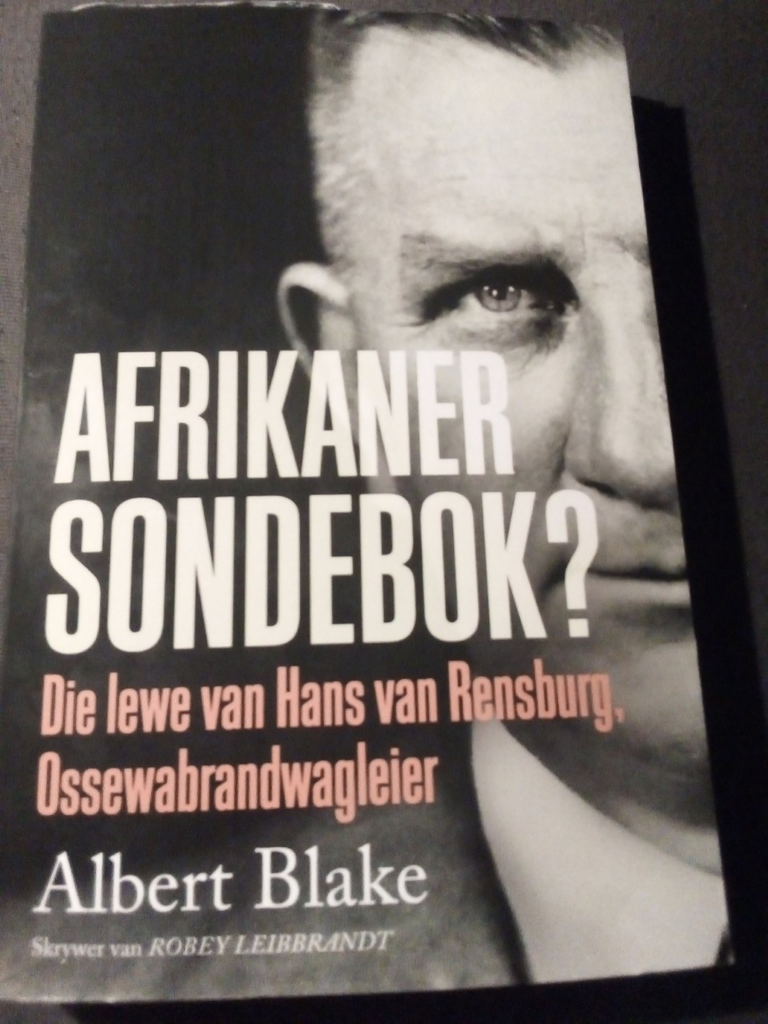
Good day Hivers and Book Clubbers,
Welcome to part two of my review of the book 'Afrikaner Sondebok?' by Albert Blake. In the first part, I looked back at the first sixteen years of Van Rensburg's life, and talked about events in South-Africa that corresponded to that period. The last article ended at the start of World War 1, and the corresponding failed 1914-rebellion in the ex Boer republics. Let's continue with the story proper.
Conversion to nationalism
Van Rensburg's experiences of going on commando in the 1914-rebellion were a watershed moment in his life. He vowed to himself to never let anything of the sort -that is Afrikaner fighting Afrikaner for someone else's gain- happen to this people again. For that, the main obstacle became clear; the British Empire of which the Union of South-Africa was part. His student years at Stellenbosch, a town which was very Afrikaner and nationalist-oriented, only cemented this, along with harboring Van Rensburg's republican feelings.
He went on to study Letters at Stellenbosch, specifically German language and literature. This orientation towards things German would be a significant thread throughout his life. His reading of German authors like Nietzsche and Spengler would also filter into his politics.
Another thing that became obvious to him was the necessity of advocating for Afrikaans as a full language. The status of Afrikaans at the time (1910s and early 1920s) was vague; it was spoken by the Afrikaners, which were a majority of the white population, yet it was not an official language of South Africa. South Africa had two official languages at its founding in 1910: English and, remarkably, Dutch. Afrikaans was by some considered to be nothing more than a dialect of Dutch, which retained its written form in the administration. There had been a movement for the advocacy of Afrikaans as a full, written language for decades.
The turning point for the Afrikaans language coincided with Van Rensburgs shift in career focus. He became involved with Hertzog's national party, and helped to organise in Pretoria, to where he had relocated in 1924 after his studies at Stellenbosch. He would continue to study law at Pretoria. The National Party would win for the first time in 1924, and in a coalition wit Labour would rule the country. Among other things, it meant that Afrikaans replaced Dutch as South Africa's 2nd official language. A milestone.
He would start his career in governmental administration in several posts, climbing the ranks and eventually also becoming a Doctor in Law. As the 1920s went on, he would also become more distant towards the then current trends in South-African politics. The pact-government between National and Labour focused more on economic/labor issues, and the republican ideal among other things was put on ice, to the dismay of Van Rensburg.
Yet his career in governmental administration would continue to go well, despite his disagreements with the path of said government. In 1936 he would become administrator of the Free State, something akin to Governor in the US, and was the youngest man to hold that position ever.
Politics around him would shift drastically in the early 1930s, however. The two main parties of South Africa since its inception in 1910 had been Smuts' SAP and Hertzog's National Party. These two parties fused together to combat the worldwide economic crisis which also hit South Africa. This fusion was lamented by Afrikaner nationalist, who saw Hertzog as selling out his principles to the Smuts and the British Empire. A splinter-group of Purified Nationalists soon formed under D.F. Malan, which had Van Rensburg's sympathy. Yet he remained at his post to serve the Hertzog-Smuts administration.
Flirtations with Germany
Another European event in the early 1930s became a formative experience for Van Rensburg; the rise of national socialism in Germany in 1933. Van Rensburg went to the 1936 Olympics in Germany, and saw a country that was in the process of reinventing itself after the complete stagnation of the Weimar Republic. Certain ideas out of national socialism became his, including an aversion to party-politics and the authoritarian state.
Similar to Germany, South Africa would see a rise in Afrikaner nationalistic sentiment in the 1930s. Specifically during the remembrance of the Great Trek, held in 1938 as a 100-year jubilee, Afrikaner sentiments seemed to reach a fever pitch. A symbolic track with ox-wagons was organized to go from Cape Town all the way to the Transvaal, visiting many important landmarks in Afrikaner history. Van Rensburg himself joined the celebrations that took place in Bloemfontein, his city of residence.
Out of the energy that was created among Afrikaner ranks, many new organisations sprang. One of them was the Ossewabrandwag, literally translated it means 'Oxwagon Sentinels'. This organisation was culturally-minded at first, with the creation of a South African republic as its highest ideal, and the promotion of Afrikaner culture, language etc.
Interlude
Van Rensburg would become head of the OB in january of 1941, and he would have to give up his job as administrator of the Free State to take such a extrapolitical stance. He changed the organisation into something different entirely. The fate of his organisation and his political career were soon bound to a world-wide event which also made its influence felt in South Africa: the Second World War.
I'll leave the rest of the story for the third and final part. I'll see you all in the next one,
-Pieter Nijmeijer
(Top photo: self-made picture of front book cover)
Your content has been voted as a part of Encouragement program. Keep up the good work!
Use Ecency daily to boost your growth on platform!
Support Ecency
Vote for new Proposal
Delegate HP and earn more